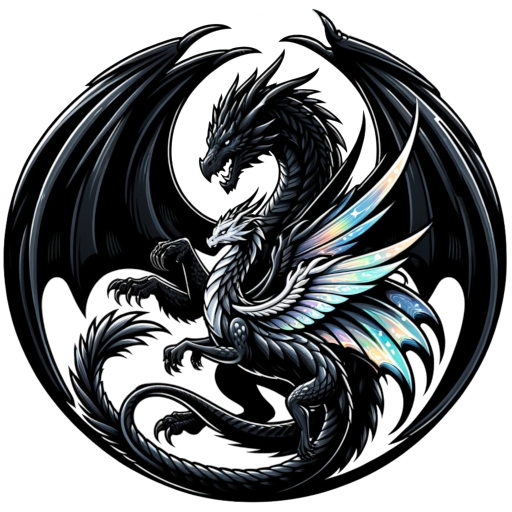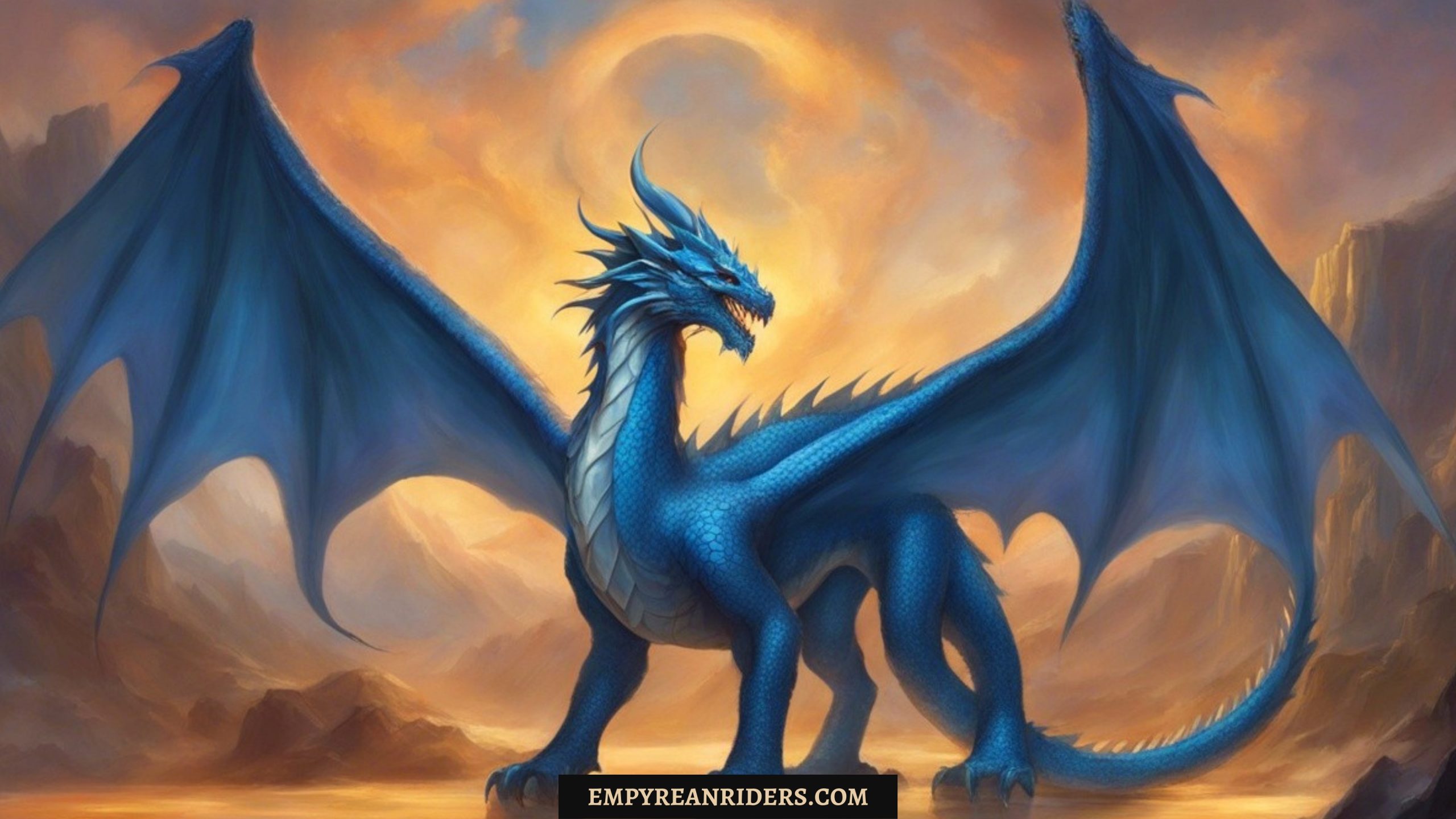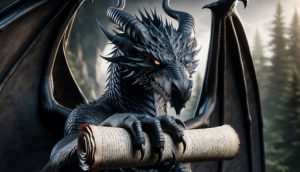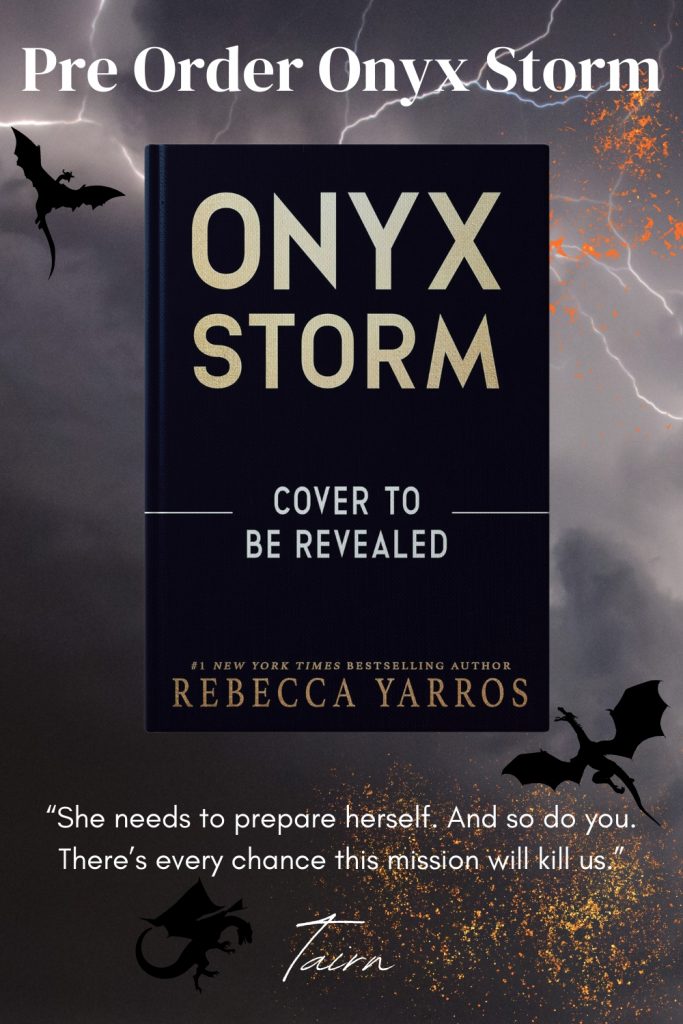You wonder how to pronounce Tairn and probably what exactly does it mean? Is there any relation between the dragon names in Fourth Wing and Iron Flame with the actual characters they bond? Or maybe the signets they produce?
I am here to help. Now, before we go any further with this, I need to point out that I did my research in Scottish Gaelic, but I am not a Scottish Gaelic speaker.
I strive to produce the best and most accurate content here, and I’m currently searching for a Scottish Gaelic speaker to double-check this. If you are a Scottish Gaelic speaker or know one, please get in touch!
Why Scottish Gaelic?
Rebecca Yarros picked Scottish Gaelic words because they sound fantastic and mysterious, but also because her mother’s side comes from a clan in Scotland. Rebecca herself doesn’t speak Scottish Gaelic either, but she said she will be taking lessons to ensure the correct pronunciations of her characters.
Scottish Gaelic is a minority language. UNESCO classifies Gaelic as “definitely endangered,” with an estimated 20,000 to 30,000 active users.
What is Scottish Gaelic?
Scottish Gaelic, also known as Scots Gaelic or simply Gaelic, is a Goidelic language of the Celtic branch within the Indo-European family, native to Scotland. It evolved from Old Irish and became a distinct language around the 13th century. Scottish Gaelic was once widespread in Scotland, as evidenced by Gaelic-language place names.
Scottish Gaelic is not an official language of the UK or Scotland but is recognized under the European Charter for Regional or Minority Languages. The Gaelic Language (Scotland) Act 2005 established Bòrd na Gàidhlig to promote the language.
Gaelic likely arrived in Scotland between the 4th and 5th centuries CE, with the foundation of the Gaelic kingdom of Dál Riata. It expanded from Dál Riata into Pictish areas from the 8th century. By the 11th century, Gaelic had become the dominant language in Scotland, reaching its zenith around 1018. However, from the reign of King Malcolm Canmore (1058-1093), Gaelic began to decline, eclipsed by Norman French and English influences.
Efforts to encourage Gaelic use increased in the late 20th century, despite historical policies that promoted anglicisation. World War I and subsequent events significantly reduced Gaelic speakers. While some Lowland Gaelic dialects are now extinct, modern Scottish Gaelic is primarily influenced by the Outer Hebrides and Isle of Skye dialects.
Why is the use of Scottish Gaelic existing?
Since the popularity of Fourth Wing and Iron Flame, there has been a growing interest in learning elements of Scottish Gaelic. While this interest doesn’t always lead to fluency, an increasing number of people are eager to learn about the language’s history and pick up basic words and phrases.
This surge in curiosity places Scottish Gaelic in the spotlight, potentially encouraging younger generations to take an interest in learning and sustaining the language.
How to pronounce the dragons’ names in Fourth
Wing and Iron Flame
Keep in mind that Scottish Gaelic pronunciation can be quite distinct and may vary by region. Listening to a native speaker is the best way to get an accurate sense of the pronunciation.
Tàirneanach – TAHR-nyuh-nuhkh. This means thunder in Scottish Gaelic. A rather fitting name given that Tairn bonded Violet whose signet is that of Lightening. A fitting duo.
- Tahr” – This part sounds like the English word “tar” but with a slightly rolled ‘r’.
- “nyuh” – Similar to the English word “new” but with a shorter ‘y’ sound.
- “nuhkh” – The final part has a guttural, Scottish ‘ch’ sound, like the ‘ch’ in the Scottish word “loch.”
Andarnaurram – An dàrna urram. It’s actually three words and it means second honour. I have many things to say about her name. It could mean that she was the second to bond Violet. Or it could be related to the fact that Andarna was left behind and she has the second honour to do…something.
- An – Pronounced like the English word “an,” with a short, open ‘a’ sound.
- Dàrna – Pronounced as “DAHR-nuh”: “Dàr” sounds like “dar” in “darling,” with a slightly rolled ‘r’. “na” is like “nuh” in the English word “number.”
- Urram – Pronounced as “OOR-um”.”Urr” sounds like “oor” in “door.” “am” is pronounced as “um” in “plum.”
Sgaeyl – It’s actually sgàil in Scottish Gaelic, pronnounces SKAH-il. It means shadow. This is really poetic isn’t it?
- “Ska” – The “sk” sound is like in “skate,” and “a” is pronounced like the ‘a’ in “father.”
- “il” – This part is similar to the ‘il’ in the English word “bill,” but with a slightly rolled ‘l’.
Aimsir – AM-shir. It means weather. Again, can you see how fitting the name is? It has to do with the signet of their bonded in the book, for sure.
- “Am” is pronounced like the English word “am.”
- “Shir” is similar to the English word “sheer,” but with a slightly rolled ‘r’ at the end.
Aotrom – OO-trum. The meaning is light in the sense of not being heavy. I do have to admit that this name throws me off a little. Because Aotrom is Ridoc’s dragon and Ridoc is an ice wielder and not an air wielder.
- “Oo” – This is pronounced like the ‘oo’ in “food” but slightly shorter.
- “Trum” – This sounds similar to the English word “trum” in “trumpet,” with a rolled ‘r’.
Baide – Badʲ meaning group/flock.
- The initial sound /b/ is pronounced as in English, similar to the ‘b’ in “bed.”
- The vowel sound /a/ is like the ‘a’ in “father,” but possibly a bit shorter.
- The final sound /dʲ/ is a palatalized ‘d,’ which means it is pronounced with the tongue raised towards the hard palate (the roof of the mouth near the front teeth). This can give the ‘d’ a slightly ‘y’-like quality, making it sound somewhat softer and less abrupt than the English ‘d.’
Breugan – Comes from breug which is pronounced as bree-ak. It means falsehood. This is professor Carr’s dragon. We already know he is a pretty evil one…
- It’s pronounced like “bree-ah,” with the beginning “bree” similar to the ‘cra’ in “crack,” with a slightly rolled ‘r.’
- The “dh” at the end is often either silent or pronounced very softly, almost like a ‘y’ or ‘oo’ sound, depending on regional dialects. So, it’s like “bree-ah” with a gentle ‘y’ or ‘oo’ sound at the end.
Cath – Kah. The name means battle or fight. I think this is going to be very relevant when it comes to Dain, picking his sides and also about Cath as she is too close to corruption. I have a theory relevant about her bad smell.
- “Ca” – This part sounds like “kah,” with the ‘a’ as in “father.”
- The ‘th’ at the end is not pronounced as in English. Instead, it is silent, so the word ends after the ‘a’ sound.
Chradh – KRAH-oo or KRAH. It means physical or emotional pain. Given that this is Garrick’s dragon, I have to ask what is going on here???
- “Kra” – The beginning is similar to the ‘cra’ in “crack,” with a slightly rolled ‘r’.
- “dh” – The ending “dh” in Gaelic is often either silent or pronounced very softly, almost like a ‘y’ or ‘oo’ sound depending on regional dialects.
Claidh – Possibly cladh which means cemetery or burial ground. Pronounced kLuhg.
- The initial sound /k/ is pronounced like the ‘k’ in “kite.”
- The sound /L/ is represented by a voiceless lateral fricative sound, similar to the ‘L’ sound in Welsh.
- The vowel sound /ɤ/ is somewhat similar to the ‘u’ in the French word “fleur.”
- The final sound /ɣ/ is a voiced velar fricative, similar to the ‘g’ sound in the Scottish English word “loch.”
Cruth – Kruh.It means figure which is very self-explanatory given that it’s Quinn’s dragon.
- It’s pronounced as “kruh,” with the initial “k” sound followed by “ruh.”
Codagh – It’s actually cogadh in Scottish Gaelic and it’s pronnounced “KOH-guh” or “KOH-gah”. It means war.
- “Koh” – This is pronounced like the ‘co’ in “cot,” but with a slightly longer ‘o’ sound.
- “gadh” or “gah” – This part can vary by dialect. The ‘g’ is pronounced as in the English word “go.” In some dialects, the ‘dh’ at the end is pronounced as a ‘y’ or ‘g’ sound, while in others, it’s silent, making the word end with the ‘a’ sound.
Cuir – Koor. It means to place, to put. this is Bodhi’s dragon.
- The initial sound /k/ is pronounced like the ‘k’ in “kite.”
- The vowel sound /u/ is like the ‘oo’ in “food.”
- The final sound /rʲ/ is a palatalized ‘r,’ meaning it’s pronounced with the tongue raised towards the hard palate, giving it a slightly ‘y’-like quality.
Deigh – Jay. It means ice which again, really threw me off as this is Liam’s dragon. But I do have a theory about it.
- The “dei” part is pronounced like the English word “jay.”
- The “gh” at the end is silent, so the word ends with the ‘ay’ sound.
Feirge – This comes from the genitive case for fearg pronnounced as fyahrg. It means anger.
- “Fyahr” – The “fe” is pronounced like ‘fy’ in “fye,” and the “ar” is somewhat similar to the ‘ar’ in “far,” but with a slightly rolled ‘r’.
- “g” – The final ‘g’ is pronounced, but it’s more guttural, similar to the ‘g’ in the German word “tag.”
Fuil – FOO-il. It means blood.
- Foo” – This part is pronounced like the English word “food,” but shorter.
- “il” – The ending is similar to the ‘il’ in the English word “bill,” but with a slightly rolled ‘l’.
Gaothal – Come from gaoth which means wind. It’s pronounced gowth.
- The initial sound /g/ is pronounced like the ‘g’ in “go.”
- The vowel sound /ɯː/ is similar to the ‘oo’ in “food,” but with a slightly different mouth position.
Glane – gLAN. It means clean/pure. It’s Imogen’s orange dragon.
- The initial sound /g/ is pronounced like the ‘g’ in “go.”
- The sound /L/ is represented by a voiceless lateral fricative sound, similar to the ‘L’ sound in Welsh.
- The vowel sound /a/ is like the ‘a’ in “father.”
- The final sound /n/ is pronounced like the ‘n’ in “no.”
Gleann – GLYOW-n. It means valley.
- “Gly” – The beginning is pronounced like the ‘gle’ in “glen,” with a slightly more pronounced ‘y’ sound.
- “ow-n” – The “ann” part is pronounced like “own” in English, but with the ‘n’ sound pronounced at the end.
Fann – fauN”or faNʲə. It means weak. It is Ulices’s dragon.
- /fauN/:
- The initial sound /f/ is pronounced like the ‘f’ in “fish.”
- The vowel sound /au/ is similar to the ‘ow’ in “cow.”
- The final sound /N/ is a nasal ‘ng’ sound, like the ‘ng’ in “song.”
- /faNʲə/:
- The initial sound /f/ is pronounced as in the previous example.
- The final sound /Nʲə/ consists of a nasal ‘ng’ sound followed by a palatalized ‘y’ sound, pronounced with the tongue raised towards the hard palate.
Greim – Either grɤim or greməNən. It means bite/morsel.
- /grɤim/:
- The initial sound /g/ is pronounced like the ‘g’ in “go.”
- The vowel sound /rɤ/ is somewhat similar to the ‘ur’ in “fur,” with a central, unrounded vowel.
- The final sound /im/ is pronounced as “im.”
- /greməNən/:
- The initial sound /g/ is pronounced as in the previous example.
- The sound /re/ is like the ‘re’ in the English word “red.”
- The final sound /məNən/ consists of a nasal ‘ng’ sound followed by a schwa sound and another nasal ‘ng’ sound.
Maise – Mash-uh. It means beauty.
- The initial sound /m/ is pronounced like the ‘m’ in “mother.”
- The vowel sound /a/ is like the ‘a’ in “father.”
- The sound /ʃ/ is pronounced like the ‘sh’ in “shoe.”
- The final sound /ə/ is pronounced as a schwa sound, similar to the ‘a’ in “sofa.”
Malla – I believe it comes from mall which means slow or mallachd which means curse. It’s pronounced mauL or ma-LUKH.
Marbh – MAHR-uhv. It means dead.
- “Mar” – This part is pronounced like the English word “mar” in “marble.”
- “bh” – The ‘bh’ in Gaelic often has a ‘v’ sound, so this part sounds like “uv” in “above.”
Sliseag – SLEE-shak. It means a slice or sliver.
- “Slee” – This part is pronounced like the English word “sleeve,” but shorter.
- “shak” – The ending sounds like “shack” in English, with a slight emphasis on the ‘sh’ sound.
Smachd – SMAHK-t. It means control or discipline.
- “Sma” – This part is pronounced like “smah,” with the ‘a’ as in “father.”
- “chd” – The “chd” is a bit tricky. The ‘ch’ is a guttural sound, similar to the ‘ch’ in the Scottish “loch.” The ‘d’ at the end is pronounced but can be quite soft, almost blending with the ‘ch’ sound.
Solas – SOH-luhs. It means light which is very confusing given how mean Solas was. Question is, was it an ironic name? Because Solas had one eye?
- “Soh” – This part is pronounced like the ‘so’ in “soda.”
- “luhs” – The ending sounds like “lus” in the English word “lust,” with a slightly softer ‘s’.
Teine – TYEH-nyeh. It means fire. Again, this is very confusing given that Mira’s signet has to do with wards. Unless there is a hint of how they may perish, or it’s a hint of the fact that Mira’s extending the Iron Flame (kinda, sorta).
- Tyeh” – The “t” is pronounced as in English, and the “ei” is similar to the ‘ey’ in “they.”
- “nyeh” – This part is pronounced like the ‘ni’ in “knee” but with an added ‘eh’ sound at the end, similar to the ‘e’ in “bed.”
Thoirt – I believe it comes from Toirt which means importance, value. It’s pronounced as tohRshd. This is Sloane’s dragon!
- The initial sound /t/ is pronounced like the ‘t’ in “table.”
- The vowel sound /ɔ/ is similar to the ‘o’ in “thought.”
- The sound /Rʃ/ is a combination of a rolled ‘r’ followed by a palatalized ‘sh’ sound.
- The final sound /dʲ/ is a palatalized ‘d,’ meaning it is pronounced with the tongue raised towards the hard palate, giving it a slightly ‘y’-like quality.
I used this Gaelic dictionary to help me find the meaning and the pronunciation. I then tried to explain how the pronunciation would work. I appreciate it’s not perfect or ideal, but hopefully, it makes it easier for you to pronounce the dragon’s names. If you do have suggestions, I absolutely welcome them all in the comments section below!





Leave a Reply